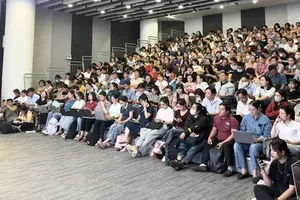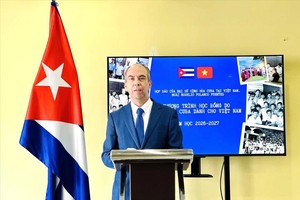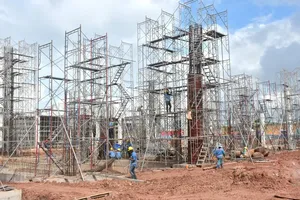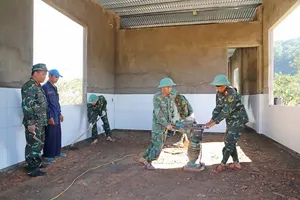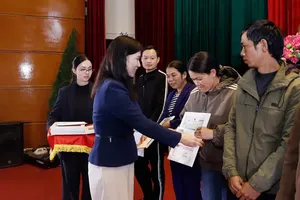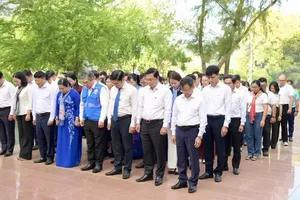It didn't happen only once. When Duong's heart stopped beating for the third time, the family of the lone survivor of a plane crash expected the worst case scenario.
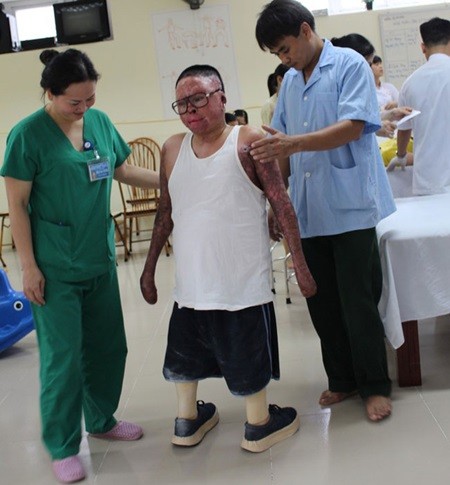
"We were beyond hope. We had even prepared a funeral which was expected to come in hours," said his mother, Trinh Thi Dong.
Intensive care
On July 7, 2014, a Russian-made MI-171 military helicopter with 21 people aboard flew on a parachute training mission in Hoa Lac Village of Ha Noi's Thach That District. It lost ground contact and crashed 16 minutes after takeoff, killing 18.
Senior lieutenant Dinh Van Duong was rushed to the National Institute of Burns, along with two other soldiers. He suffered burns over 50 per cent of his body, as well as acute respiratory distress.
A council was quickly formed by doctors from the NIB, Viet Duc Hospital, and Bach Mai Hospital. Unfortunately, one of the survivors died 12 days after the crash. Another died two months later.
So family and physicians gave up hope when Duong's heart stopped for the third time in four months of intensive care.
"The first four months of intensive care at the National Institute of Burns demonstrated the persevering struggle for life of the whole family and unit, especially after Duong's two comrades were gone," Senior Lieutenant Ngo Van Hieu from the Ha Noi Capital High Command said.
During those first four months, Duong underwent seventeen operations. Additional surgeries later pierced flesh from his buttocks to implant in burned areas.
"When the helicopter crashed, Duong fell onto a tree. He still remembers the moment his comrades came to rush him to hospital," a doctor who provides medical care to Duong told Tuoi tre (Youth).
"He lost consciousness after he was transported to the hospital. He fell into a coma that lasted for the next 100 days," the doctor said.
In his first two months in hospital, the commando soldier fought against septic shock, multi-organ dysfunction, respiratory problems, and cardiac arrest.
Miracle of life
Duong's heart stopped beating for hours. But doctors decided to keep his respirator functioning until he showed no signs of life. The following day, a miracle occurred and his heart started beating again. Days later, he could speak a little, breathe through his mouth, and eat soup and milk.
"When he revived, the first thing Duong said was "Mom!" said his 60-year-old mother, who has been at his side since he entered the hospital.
"Later on, he remembered how the accident happened," she added. "After takeoff that day, the helicopter experienced operating problems. The pilot managed to fly away from residential areas before it crashed".
As soon as they withdrew Duong's respirator, doctors tested him with questions about his wife, children, and family. He answered with the exact names of his wife, children and other family members. Duong's recovered memory is highly valued by medical practitioners.
In the first four months of intensive care, Duong was at death's door many times," said Dr. Nguyen Hai An, head of the institute's First Aid Recuperation department.
Remarkably, "on the 77th day, his four visceras failed, kidneys failed, the mucous membrane of the lungs peeled off, and his blood pressure dropped, while there was no urine at all. Duong's strong will to live - and his effort to do so - have contributed to the success of the treatment," An said.
"On some days, doctors gave up hope. But later, when kidney and other visceras recovered, hope returned."
Director of the institute, Dr. Nguyen Gia Tien, said Duong was the most exceptional case brought back to life at the National Institute of Burns, after having suffered from polytrauma, with a large area of skin burned.
"I used to be a commando, so I have been recovering well," Duong said "But more importantly, my family inspires me to stay alive."
When Duong saw himself in a mirror his mother brought at his insistence, he shouted. "Oh my god, how fat and ugly I look!" He stopped complaining later and focused more on walking. Many times Duong's pain was so severe that he wanted to die. But his mother kept encouraging him: "You are the only one alive, out of 22 people. And the State has spent a lot of money curing you. So you can't die."
Live to dream
More than 600 days have passed since the senior lieutenant stayed in the hospital. In addition to his mother, Dong, who remained at his side while he was in the hospital, his wife, Nguyen Thi Hai also managed to be there as much as possible.
More than once while he was in intensive care, Hai sat by Duong's side, reminding him of happy times they shared together, their children and family members. When she spoke of their son who was born just two days after the incident, he managed to blink his eyes.
Although many surgeries are still in his future, Duong's marvelous mental and physical recovery - and his ability to walk on his new artificial feet - gives his family hope that he will turn home to his life soon. Returning to work may not be possible. But he remains a vital part of his family.
Duong dreams of owning a pair of artificial legs with joints. But the first thing he will do when he leaves the hospital is "return to the place where the plane crashed to burn incense for my fallen comrades."







